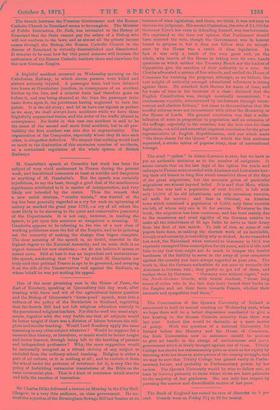The cruel " option " in Alsace-Lorraine is over, but
we have as yet no authentic statistics as to the number of emigrants. It seems certain that on the last days of the option the roads and railways to France were crowded with Alsatians and Lorrainers leav- ing their old homes in long files which resembled those of the days of the great migrations, but the accounts given of particular migrations are almost beyond belief. It is said that Metz, which before the war had a population of over 50,000, is left with only 10,000 of its old inhabitants, and only seventeen recruits, all unfit for service ; and that in Obernai, an Alsatian town which contained a population of 6,000, only three recruits are left, of whom only one is fit for service. Whatever be the truth, the migration has been enormous, and has been mainly due to the monstrous and cruel rigidity of the German resolve to make all the inhabitants of fit age liable to serve in their Army from the first of this month. To talk of this, as some of our papers have done, as making the shortest work of an hievitable, though cruel necessity, is incredibly silly or wicked. As we remarked last week, the Rhineland when restored to Germany in 1814 was expressly exempted from conscription for six years, and it is idle and false to say that time might not do much to temper the fearful harshness of the liability to serve in the army of your conqueror against the country you have always regarded as your own. The truth is, that the German authorities do not want to reconcile the Alsatians to German rule ; they prefer to get rid of them, and replace them by Germans. "Germany sees without regret," says the North-German Gazette, with brutal candour, "those long trains of exiles who in the last days have turned their backs on the Empire and set their faces towards France, whither their interests and sympathies lead them."


































 Previous page
Previous page